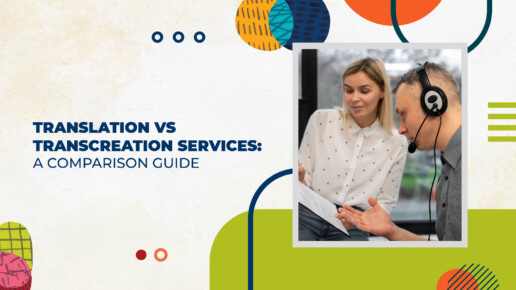Translation vs. Transcreation Services: A Comparison Guide
Effective communication across languages is crucial. Whether you’re a business looking to expand into new markets or an author wanting to reach a broader audience, language services like translation and transcreation can help bridge the gap. But what exactly are these services, and how do they differ? This guide will walk you through the ins and outs of translation vs transcreation services, helping you decide which is best suited for your needs.
What is Translation?
Definition and Overview
Translation services is the process of converting text from one language to another while maintaining the original meaning. It focuses on delivering a message accurately and consistently, ensuring that the translated text is an exact representation of the source material.
Types of Translation
Literary Translation: Translating books, poems, and other literary works, preserving the original tone, style, and context.
Technical Translation: Involves translating manuals, guides, and other technical documents with precise terminology.
Legal Translation: Converting legal documents such as contracts, laws, and regulations, requiring a deep understanding of legal jargon.
Medical Translation: Translating medical documents like patient records, research papers, and pharmaceutical information, demanding high accuracy and familiarity with medical terminology.
What is Transcreation?
Definition and Overview
Transcreation, short for “translational recreation,” goes beyond simple translation. It involves adapting a message from one language to another while maintaining its intent, style, tone, and context. This process often requires a creative touch to ensure the message resonates culturally and emotionally with the target audience.
The Creative Aspect of Transcreation
Unlike translation, which aims for accuracy, transcreation focuses on creativity. It’s about recreating the original message in a way that feels natural and engaging to the new audience, often incorporating cultural nuances and idiomatic expressions.
When to Use Transcreation
Transcreation is ideal for marketing materials, advertisements, slogans, and other content where emotional impact and cultural relevance are critical. It’s used when you need more than just a literal translation; you need a message that connects on a deeper level.
Advantages of Translation Services
Accuracy and Consistency
Translations ensure that the message is conveyed accurately and consistently across different languages, which is essential for technical, legal, and medical documents.
Wide Range of Applications
From books and manuals to legal contracts and medical records, translation services are versatile and applicable to numerous fields.
Cost-Effectiveness
Generally, translation services are more affordable than transcreation because they require less creative input and are often more straightforward.
Advantages of Transcreation Services
Engaging and Persuasive Content
Transcreation produces content that is not only accurate but also engaging and persuasive, making it perfect for marketing and advertising.
Challenges of Translation Services
Loss of Nuance
In some cases, translation may lead to a loss of subtle nuances and emotional undertones present in the original text.
Contextual Limitations
Translations can sometimes lack context, especially if the translator is not familiar with the cultural or situational background of the source material.
Challenges of Transcreation Services
Higher Costs
Due to the creative effort involved, transcreation services tend to be more expensive than traditional translation.
Time-Consuming Process
The creative nature of transcreation means it can be more time-consuming, as it involves more than just translating words; it’s about crafting an entirely new message.
Choosing the Right Service for Your Needs
Assessing Your Goals
Consider what you aim to achieve with your content. If accuracy and consistency are paramount, translation may be the better option. If cultural resonance and engagement are more important, transcreation could be the way to go.
Considering Your Budget
Budget is a significant factor. While transcreation offers more creative benefits, it comes at a higher cost. Weigh the benefits against your budget constraints to make an informed decision.
Conclusion
Both translation services vs transcreation services are vital services in our interconnected world. While translation focuses on accuracy and consistency, transcreation emphasizes cultural relevance and engagement. By understanding the key differences and benefits of each, you can choose the service that best meets your needs and goals. Whether you need precise translations or creatively adapted content, both services offer unique advantages to help you communicate effectively across languages and cultures.

